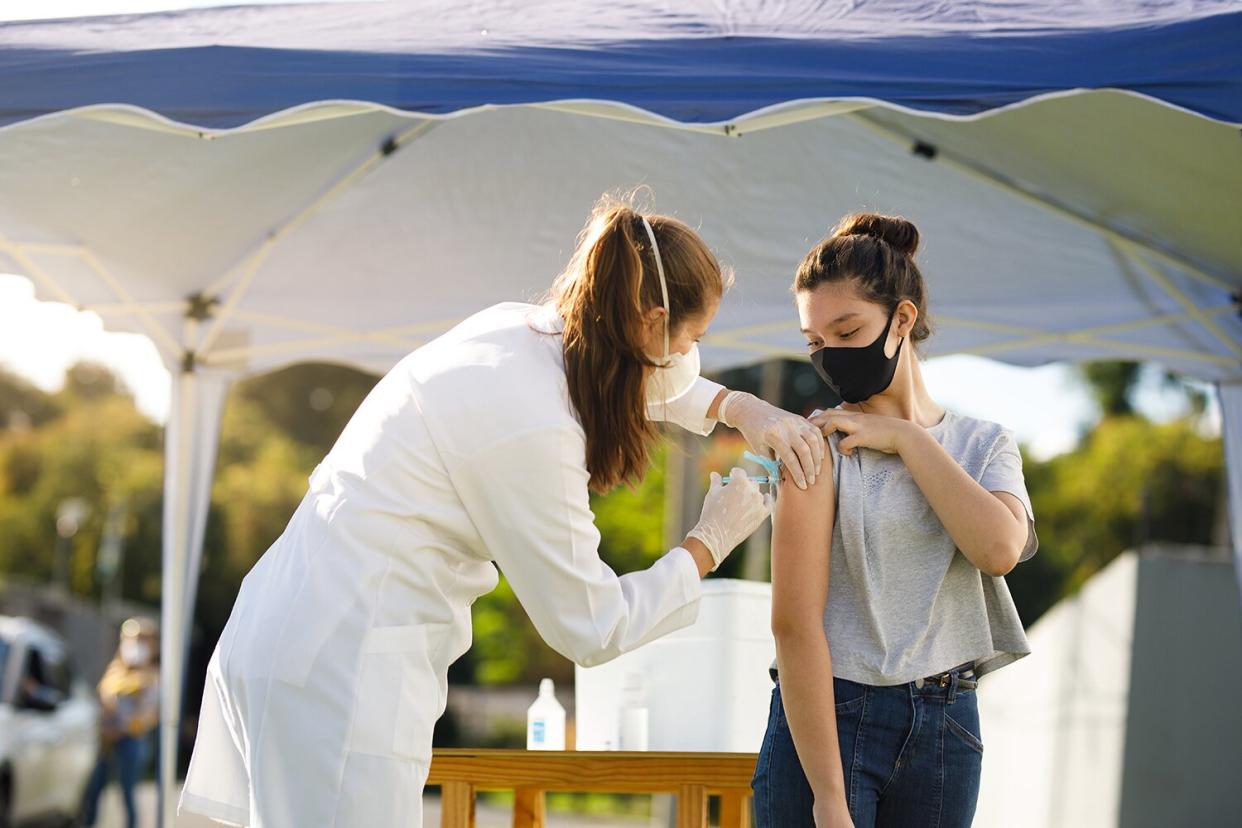What Parents Need to Know Now That Kids Aged 12 to 15 Are Eligible for a COVID Vaccine

Getty A teen receives a COVID-19 vaccine
On Monday, the Food and Drug Administration announced that it has approved Pfizer-BioNTech's COVID-19 vaccine for use in 12- to 15-year-olds, a crucial step in expanding vaccine eligibility in the U.S. and ending the pandemic.
An advisory panel at the Centers for Disease Control still needs to sign off on the decision before kids can start making their appointments for the vaccine, which is expected to happen on Wednesday. In the meantime, parents and adolescents understandably have questions about getting vaccinated.
RELATED: FDA Approves Pfizer's COVID Vaccine for Use in 12- to 15-Year-Olds
Here, Dr. Elizabeth Murray, a pediatrician specializing in Pediatric Emergency Medicine and Child Health Advocacy and a member of PEOPLE's Health Squad, and Dr. Jennifer Nayak, associate professor of pediatrics at the University of Rochester Medical Center specializing in infectious diseases, share what families need to know.
Why should adolescents get vaccinated?
"The concept of children not being impacted as severely by COVID-19 infection simply is not true," says Murray. "Children are about 25% of the population and millions have been infected, with thousands hospitalized — and hundreds have died. Further, we know that COVID-19 infection hurts the function of some children's hearts and we don't know how long those and other side effects will last. Protecting our communities means immunizing all within our communities."
Nayak adds that this highly active age group is one of the most likely to be spreading COVID-19. The CDC has said recently that youth sports have led to an increase in cases.
"This is a population of children engaged in social activities outside of the home, with a higher risk of infection and perhaps of transmitting disease," she says. "
What should parents who are wary know about vaccinating their kids?
"This isn't a 'one size fits all' situation," Murray says. "It's so important for parents to get factual information from a trusted resource. For most families, that should be their pediatrician or family practice doctor. Primary care doctors are ready to have one-on-one conversations with families to answer their specific questions."

Getty A teen receives a COVID-19 vaccine
Both Murray and Nayak are parents themselves, and will sign their kids up for the vaccine when it's available.
"After evaluating the data available to date, I plan to vaccinate my 14-year-old daughter as soon as I am able to," says Nayak.
"Our children will receive the vaccine as soon as they are eligible," adds Murray.
Are allergies a concern?
The same vaccine recommendations for adults with allergies apply to kids, says Nayak.
"While cases of anaphylaxis, or a severe allergic reaction, have occurred after administration of mRNA vaccines, this risk is rare, reported in around 2.5 to 11 adults per million doses of mRNA vaccine administered," she says. "That being said, certain precautions are recommended for individuals with allergies. It is not recommended that an individual receive a COVID-19 mRNA vaccine if they have had an allergic reaction to a previous dose of an mRNA vaccine or polyethylene glycol (PEG)."
RELATED VIDEO: The Importance of the COVID-19 Vaccine and the Call for 'Unity'
"Further, as most allergic reactions occur shortly after vaccination, individuals with a history of a severe reaction need to be monitored for 30 minutes following vaccine administration. All sites administering vaccine are required to have medications and other necessary treatments on hand in case of an allergic reaction."
Will kids receive a smaller vaccine dose?
For this age group, they'll get the same dosage as adults, Nayak says. But that may change for the younger kids who are now in clinical trials, which she is conducting at the University of Rochester.
"The initial part of the clinical trials being conducted to study COVID-19 vaccines in younger children, 6 months to 11 years of age, involves what is called a 'dose-escalation' phase to determine the correct dose to administer for each age group, balancing side effects such as pain and fever with the ability of the vaccine to promote an immune response," Nayak says. "While these trials are still ongoing, it is expected that a lower dose of vaccine may be needed for the younger age groups."
Given that younger people tend to have stronger immune responses to the vaccine, what should kids expect in the day or two after their inoculation?
"Based on the data available, I would expect symptoms similar to what have been seen in the adult population," says Nayak. "Parents should talk to their children about what to expect following vaccination, including the possibility of having symptoms such arm pain, tiredness, or a fever. Each child will respond to vaccination differently, and parents (and schools) should be prepared for the possibility that a child may need to be absent for a day following vaccination."
With kids getting vaccinated now, will schools be able to open in the fall with fewer precautions like distancing and masks?
"It's hard to know. There are so many factors that need to be considered," Murray says. "However, increased vaccination rates will definitely help to lessen the need for distancing and masking guidelines."
As information about the coronavirus pandemic rapidly changes, PEOPLE is committed to providing the most recent data in our coverage. Some of the information in this story may have changed after publication. For the latest on COVID-19, readers are encouraged to use online resources from the CDC, WHO and local public health departments. PEOPLE has partnered with GoFundMe to raise money for the COVID-19 Relief Fund, a GoFundMe.org fundraiser to support everything from frontline responders to families in need, as well as organizations helping communities. For more information or to donate, click here.

